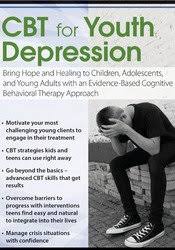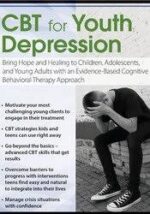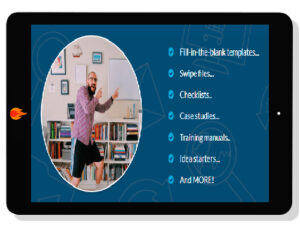When depressed young people come to your office it’s often not by choice. Worried parents, unsure if this is just a phase or something more, come to you with kids who feel they’ve been brought against their will.
David M. Pratt – CBT for Youth Depression
Get Client Buy-In: Engagement and Motivational Enhancement Strategies
Build a therapeutic alliance with young people
Collaborative evaluation, treatment planning and case conceptualization
Identify and build upon strengths
Motivational counseling with youth
Identify and work towards goals
The CBT Paradigm: Making it Simple to Understand and Use
Modify cognitive distortions and build social confidence
Self-Monitoring: feelings, behaviors and thoughts
Behavioral activation: get active again
Cognitive restructuring: learn to be a good “thought detective”
The art of “Socratic Questioning”
Problem solving: overcome “learned helplessness”
Social skills training: build social competence and confidence
Effective use of CBT homework assignments
On-office therapeutic structured activities
Learning CBT skills via hypothetical situations
Advanced CBT Techniques: Mindfulness Based Cognitive Therapy (MBCT) and Acceptance and Commitment Therapy (ACT)
Mindful meditation practices for youth: relax your mind
Cognitive processing therapy
Decipher and manage “ambiguous situations”
Collaborative empiricism: conducting real-life experiments
Exposure therapy for behavioral activation and social skill development
”Acceptance & Commitment Therapy”: know and be yourself
Coping plans for stressful situations
Parent Involvement Strategies: Build a Therapeutic Alliance with Families
Don’t jeopardize your relationship with the client
Involve parents in:
Initial evaluation
Treatment planning
Case conceptualization
Treatment sessions
Homework assignments
Enhance family communication and problem solving skills
”Win-Win” solutions for parents and teens
How to Handle Crisis Situations: Self-Harm and Suicide Prevention
Conduct a behavioral chain analysis
Self-harm trigger situations
Validate reasons for self-harm and suicide
Use distress tolerance and “Third Wave” CBT skills to manage a crisis
Coping cards for crisis situations
Develop a CBT skills based suicide prevention safety plan
Would you like to receive David M. Pratt – CBT for Youth Depression ?
Description:
When depressed young people come to your office it’s often not by choice. Worried parents, unsure if this is just a phase or something more, come to you with kids who feel they’ve been brought against their will. They are frequently angry, alienated, and reject the idea of depression. Fear of treatment related stigma, hopelessness about the future, and distrust can cause clients to withdraw from their therapist, giving you very little to work with and leaving you frustrated and looking for ways to engage them. And even the most seasoned clinician knows the challenges of explaining complicated treatment concepts in a way young people can comfortably understand and willingly incorporate into their lives. It all adds up to a situation in which many depressed youth fail to fully participate in the therapy they so desperately need. And the consequences are real. Left untreated, depressed adolescents are at major risk of engaging in self-harming and suicidal behaviors.
They need your help.
But how do you break down resistance to treatment, build the therapeutic alliance, and instill hope in depressed kids? How do you overcome apathy and lack of motivation to engage them, letting you get down to the crucial work that needs to be done? How do you bring complicated treatment concepts to youth in ways they can easily understand and make them feel normal, in control, and part of the process?
Widely researched, Cognitive Behavioral Therapy (CBT) has been confirmed to be an effective approach for treating depression in adolescents.
Key benefits of watching:
Learn how to motivate and engage your most challenging young clients!
Translate complex CBT concepts into practical and easy-to-understand skills that can be readily integrated into the lives of adolescents.
Teach your clients essential coping skills and employ the art of “Socratic Questioning” to help them examine and modify their cognitive distortions.
Discover how to effectively involve parents in their child’s treatment with real-world methods to enhance family communications, improve problem solving, and find “win-win” solutions to common parent-youth conflicts.
Master fundamental “Second Wave” evidence-based CBT skills and more recent “Third Wave” advances like Mindfulness Based Cognitive Therapy (MBCT) and Acceptance and Commitment Therapy (ACT) to help clients relax their minds, practice acceptance and manage stress.
Structured exercises make what you’ve learned immediately applicable to your practice and instantly useable upon your return to the office.
Transform the lives of your depressed young clients with the power of a proven, skills-based CBT approach!








